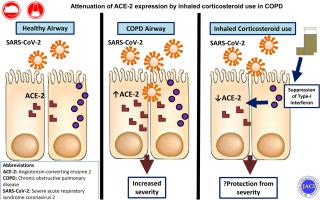Journal of Allergy and Clinical Immunology ( IF 11.4 ) Pub Date : 2020-10-15 , DOI: 10.1016/j.jaci.2020.09.034 Lydia J Finney 1 , Nicholas Glanville 2 , Hugo Farne 1 , Julia Aniscenko 1 , Peter Fenwick 1 , Samuel V Kemp 3 , Maria-Belen Trujillo-Torralbo 1 , Su Ling Loo 4 , Maria Adelaide Calderazzo 1 , Jadwiga A Wedzicha 1 , Patrick Mallia 1 , Nathan W Bartlett 4 , Sebastian L Johnston 1 , Aran Singanayagam 1

|
Background
The mechanisms underlying altered susceptibility and propensity to severe Coronavirus disease 2019 (COVID-19) disease in at-risk groups such as patients with chronic obstructive pulmonary disease (COPD) are poorly understood. Inhaled corticosteroids (ICSs) are widely used in COPD, but the extent to which these therapies protect or expose patients to risk of severe COVID-19 is unknown.
Objective
The aim of this study was to evaluate the effect of ICSs following pulmonary expression of the SARS-CoV-2 viral entry receptor angiotensin-converting enzyme-2 (ACE2).
Methods
We evaluated the effect of ICS administration on pulmonary ACE2 expression in vitro in human airway epithelial cell cultures and in vivo in mouse models of ICS administration. Mice deficient in the type I IFN-α/β receptor (Ifnar1−/−) and administration of exogenous IFN-β were used to study the functional role of type-I interferon signaling in ACE2 expression. We compared sputum ACE2 expression in patients with COPD stratified according to use or nonuse of ICS.
Results
ICS administration attenuated ACE2 expression in mice, an effect that was reversed by exogenous IFN-β administration, and Ifnar1−/− mice had reduced ACE2 expression, indicating that type I interferon contributes mechanistically to this effect. ICS administration attenuated expression of ACE2 in airway epithelial cell cultures from patients with COPD and in mice with elastase-induced COPD-like changes. Compared with ICS nonusers, patients with COPD who were taking ICSs also had reduced sputum expression of ACE2.
Conclusion
ICS therapies in COPD reduce expression of the SARS-CoV-2 entry receptor ACE2. This effect may thus contribute to altered susceptibility to COVID-19 in patients with COPD.
中文翻译:

吸入皮质类固醇通过抑制 I 型干扰素下调 COPD 中的 SARS-CoV-2 受体 ACE2
背景
慢性阻塞性肺病 (COPD) 患者等高危人群对严重 2019 冠状病毒病 (COVID-19) 疾病的易感性和倾向性改变的机制尚不清楚。吸入皮质类固醇 (ICS) 广泛用于治疗慢性阻塞性肺病,但这些疗法在多大程度上保护患者或使患者面临严重 COVID-19 的风险尚不清楚。
客观的
本研究的目的是评估 SARS-CoV-2 病毒进入受体血管紧张素转换酶-2 (ACE2) 肺部表达后 ICS 的效果。
方法
我们在体外人气道上皮细胞培养物和体内ICS给药小鼠模型中评估了ICS给药对肺ACE2表达的影响。使用缺乏 I 型 IFN-α/β 受体 ( Ifnar1 −/− ) 并给予外源性 IFN-β 的小鼠来研究 I 型干扰素信号传导在 ACE2 表达中的功能作用。我们比较了根据使用或不使用 ICS 进行分层的 COPD 患者的痰 ACE2 表达。
结果
ICS 给药减弱了小鼠中 ACE2 的表达,这一效应可通过外源 IFN-β 给药逆转,而Ifnar1 -/−小鼠则降低了 ACE2 表达,表明 I 型干扰素在机制上有助于这种效应。 ICS 给药减弱了 COPD 患者气道上皮细胞培养物和具有弹性蛋白酶诱导的 COPD 样变化的小鼠中ACE2的表达。与未使用 ICS 的患者相比,服用 ICS 的 COPD 患者的痰液中ACE2表达也有所降低。
结论
COPD 中的 ICS 疗法可减少 SARS-CoV-2 进入受体 ACE2 的表达。因此,这种效应可能会导致 COPD 患者对 COVID-19 的易感性发生改变。









































 京公网安备 11010802027423号
京公网安备 11010802027423号